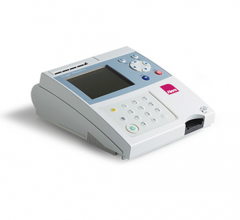June 19, 2008 – HemoCue AB, a point-of-care diagnostic test manufacturer and wholly owned subsidiary of Quest Diagnostics Inc. said its HemoCue Albumin 201 System is the first quantitative point-of-care test for screening, diagnosing and monitoring microalbuminuria to be granted a CLIA waiver by the FDA.
With the FDA CLIA waiver, non-laboratory trained physicians and other health care professionals in any health care facility with a CLIA Certificate of Waiver in the U.S. will be able to use the HemoCue Albumin 201 System to screen patients for microalbuminuria and begin treatment based on the test's results during a single office visit.
Microalbuminuria may indicate the presence of chronic kidney disease (CKD), a life-threatening condition that affects approximately 26 million Americans. Diabetes and hypertension are the two leading risk factors for developing CKD. Microalbuminuria also is an independent risk factor for developing cardiovascular disease in patients with or without diabetes or hypertension.
Microalbuminuria is a condition characterized by the presence of albumin, a protein, excreted in urine. As the albumin excretion increases, so does the risk of CKD or cardiovascular disease onset and progression. The HemoCue Albumin 201 System, which produces results within 90 seconds, enables physicians to identify and quantify low levels of albumin at the point of care for the purpose of screening for, diagnosing, monitoring and to supplement clinical evidence in the treatment of microalbuminuria. Unlike semiquantitative urine “dipstick” methods, which indicate if a patient’s microalbumin levels fall within pre-defined ranges, the HemoCue Albumin 201 System provides the actual concentration present in the sample. Using the HemoCue Albumin 201 System, physicians may monitor changes in microalbumin excretion in a patient over time.
For more information: www.hemocue.com, www.questdiagnostics.com


 August 05, 2019
August 05, 2019 








